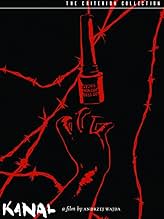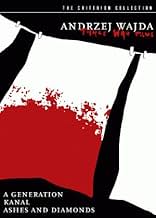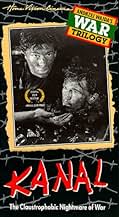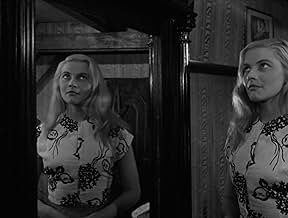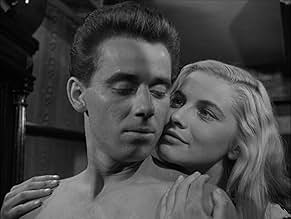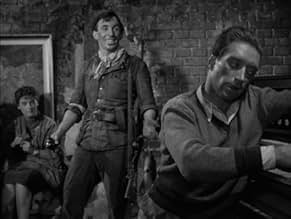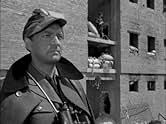IMDb रेटिंग
7.9/10
8.5 हज़ार
आपकी रेटिंग
अपनी भाषा में प्लॉट जोड़ेंIn 1944, during the Warsaw uprising against the Nazis, Polish Lieutenant Zadra and his resistance fighters use Warsaw's sewer system to escape the German encirclement.In 1944, during the Warsaw uprising against the Nazis, Polish Lieutenant Zadra and his resistance fighters use Warsaw's sewer system to escape the German encirclement.In 1944, during the Warsaw uprising against the Nazis, Polish Lieutenant Zadra and his resistance fighters use Warsaw's sewer system to escape the German encirclement.
- 1 BAFTA अवार्ड के लिए नामांकित
- 1 जीत और कुल 2 नामांकन
Vladek Sheybal
- Composer Michal
- (as Wladyslaw Sheybal)
Wlodzimierz Bednarski
- Insurgent
- (बिना क्रेडिट के)
Zenon Dadajewski
- Insurgent
- (बिना क्रेडिट के)
फ़ीचर्ड समीक्षाएं
Did Andrzej Wajda predict the modern horror film? Or was he merely acting on--and manipulating--our fear of the big, scary monster? There are many shots in KANAL where the camera will simply stay on a passageway seconds after the survivors leave the shot. As a modern audience who has lived through horror films, we expect a Nazi or a monster to slip into the frame in the background, but it never does. KANAL truly is a horror film, but what's unbearable to us and the sturdy group of Resistance fighters isn't the Nazis above the sewers or the metaphorical monster, but it is the solitude and emptiness that drives them to insanity, death or a bitter end.
KANAL is Andrzej Wajda's dirty, bloody valentine to the heroes of the 1944 Warsaw Resistance as the film follows the last hours of a band of heroes in their ultimately futile attempt to escape the Nazis through the labyrinth of underground sewers. We are first introduced to them as strong, willful humans trying to survive in a world that's falling to ruins (One could also argue that Andrzej Wajda also created the first post-apocalypse film). They laugh, they love, they play music in the last happy moments of their lives. After they enter the sewers, we expect and want them to come out even more strong-willed than ever--how many people can face dead bodies floating in the water of a dirty sewer with the same calm defiance? But as time goes on and the group gets separated, it becomes more and more inevitable that these heroes are not meant for a Hollywood's movie's happy, redemptive ending.
Andrzej Wajda, like Roman Polanski, was a real survivor of the Nazi invasion of Poland during WWII, and both became filmmakers who brought their experiences to films, as Polanski did with Oscar-winning THE PIANIST. However, Polanski's film, though absolutely profound, doesn't have Wajda's eye for details--the scenes of ruined Warsaw, for example, seem almost CGI'ed and it's obvious that he's trying to go for more, while Wajda will focus solely on the dirty ground, the debris blowing in the wind, or the flames of a burning building in the background. With Wajda, less is much more effective. If there is a situation more dirty, awful, lonely, scary or haunting than these people making their way through the labyrinths, I have yet to see it.
KANAL is Andrzej Wajda's dirty, bloody valentine to the heroes of the 1944 Warsaw Resistance as the film follows the last hours of a band of heroes in their ultimately futile attempt to escape the Nazis through the labyrinth of underground sewers. We are first introduced to them as strong, willful humans trying to survive in a world that's falling to ruins (One could also argue that Andrzej Wajda also created the first post-apocalypse film). They laugh, they love, they play music in the last happy moments of their lives. After they enter the sewers, we expect and want them to come out even more strong-willed than ever--how many people can face dead bodies floating in the water of a dirty sewer with the same calm defiance? But as time goes on and the group gets separated, it becomes more and more inevitable that these heroes are not meant for a Hollywood's movie's happy, redemptive ending.
Andrzej Wajda, like Roman Polanski, was a real survivor of the Nazi invasion of Poland during WWII, and both became filmmakers who brought their experiences to films, as Polanski did with Oscar-winning THE PIANIST. However, Polanski's film, though absolutely profound, doesn't have Wajda's eye for details--the scenes of ruined Warsaw, for example, seem almost CGI'ed and it's obvious that he's trying to go for more, while Wajda will focus solely on the dirty ground, the debris blowing in the wind, or the flames of a burning building in the background. With Wajda, less is much more effective. If there is a situation more dirty, awful, lonely, scary or haunting than these people making their way through the labyrinths, I have yet to see it.
10info-399
A great film, at first viewing people may not understand some of the cultural references. The tall blonde brave sewer-runner is not a model of Aryan Uber Womanhood but that of a strong polish woman.According to the official line of Nazi Propaganda the metaphor for the Aryan woman was of a breeder , home maker not a woman that would take a pro-active role in dragging aman half way across the canals of Warsaw. I saw the movie as less of a metaphor for hell as that of an actual hell,the hell of siege such as stalingrad. Stalingrad was not a metaphor for hell it was hell on earth. As was Warsaw in the last days of organized rebellion.As much as Das Boot style brought across a sliver of the real life incident , Kanal's style brings across the desperation of the struggle in Warsaw. The optomistic saddness can be written off as slavic melancholy, or better described as the hope and sorrow of a nation that has many times been routed from the map of europe only to resurface strong and proud.Everything was taken from them and hope itself is in question as the final reel fades to black.
This is certainly NOT a feel-good film, as it deals with the horrors of the Nazis and their crushing of the Warsaw uprising of 1944. After all, there is no way or reason to make this a nice or fun movie to view. It just isn't possible. BUT, we are treated to an intensely realistic and viscerally disturbing film showing the war in all its awfulness. The first portion of the film is set in crumbling buildings and the nobility of the cause is apparent. However, the vast majority of the film is set in the sewers (hence the title "Kanal") and the characters, over time, lose some of their nobility and just ache to survive. The film is intensely claustrophobic and the filth they move about in literally looks like raw sewage--so as the characters fight for life and, in most cases, give up hope, you find yourself being pulled into their world and their terror. A great, though intensely awful film to watch. So, it comes as no surprise that I would not recommend this film to children or people afflicted with claustrophobia.
PS--if the musician seems familiar, it's because Wladyslaw Sheybal (also known as "Vladek Sheybal") is one of the Bond Villains in the movie FROM Russia WITH LOVE.
PS--if the musician seems familiar, it's because Wladyslaw Sheybal (also known as "Vladek Sheybal") is one of the Bond Villains in the movie FROM Russia WITH LOVE.
10tutusaad
I saw this film in a film festival in Dhaka, in early sixties(Now Bangladesh, then East Pakistan). For me as a student, Sattayjit Ray's Apu trilogy was my only exposer to any kind of art film then. Visual realism was a new thing for us in Indian sub continent. Audience were so spellbound that they could smell sewage sitting in the cinema hall. I think like all great directors, Wajda had the cinematographic sense to create that environment where viewers reality could blend with creative fiction. In post war period of late forties and in early fifties like the School of Polish Posters, all creative mediums went through this fatalistic phase. It was grotesque but realistic.
That this movie was made is a near miracle, since it squeaked out barely 3 years after Stalin died; and the Polish film industry could even begin to suggest that Poles could struggle against the Germans without Soviet "fraternal" help. It looks likely that it was saved from oblivion by the Silver Palm (1957), at least in Poland. My suspicion that this got past the Party censors as a Dantean allegory about the worker and peasant struggles, with each character and episode exposing some lesson. However, like Ashes and Diamonds, much of the real message is just at the surface: regular Poles struggling for a better future.
The real hidden message of the film is a metaphorical struggle against Soviet oppression. Wajda seems to suggest this by quoting Szczepanski(1944): "... But know this: from our tombstones A victorious new Poland will be born And you will not walk this land You Red Ruler of bestial forces!" (1) Indeed the resolution suggests the Stalinist Inferno is far from over. Those who have tried to bring light to the world suffer a Promethean fate.
What seems remarkable to me is the positive spirit, humor, and love of life that most of the characters display in the face of their passage into the underworld. There is additional irony (humorous to me), for example, that the composer attempts to play a particularly patriotic Chopin, but is then ordered to play "something with feeling:" an inane dance tune. (By the way, the Beckstein piano that the composer tries to protect was made by a company that provided Hitler with crucial early support.)
It is also remarkable that such a dark, almost anti-heroic view of combatants was made only 12 years after the event. It is not so far from the spirit of Ernie Pyle, and just think how long it took to make Band of Brothers.
(1) Interview on www.wajda.pl
The real hidden message of the film is a metaphorical struggle against Soviet oppression. Wajda seems to suggest this by quoting Szczepanski(1944): "... But know this: from our tombstones A victorious new Poland will be born And you will not walk this land You Red Ruler of bestial forces!" (1) Indeed the resolution suggests the Stalinist Inferno is far from over. Those who have tried to bring light to the world suffer a Promethean fate.
What seems remarkable to me is the positive spirit, humor, and love of life that most of the characters display in the face of their passage into the underworld. There is additional irony (humorous to me), for example, that the composer attempts to play a particularly patriotic Chopin, but is then ordered to play "something with feeling:" an inane dance tune. (By the way, the Beckstein piano that the composer tries to protect was made by a company that provided Hitler with crucial early support.)
It is also remarkable that such a dark, almost anti-heroic view of combatants was made only 12 years after the event. It is not so far from the spirit of Ernie Pyle, and just think how long it took to make Band of Brothers.
(1) Interview on www.wajda.pl
क्या आपको पता है
- ट्रिवियाDirector Andrzej Wajda was himself a fighter in the Polish resistance movement against the Nazis in World War II and several scenes in the film were based on his experiences.
- गूफ़When Korab is attacking Goliath self-propelled tracked mine, a wire pulling it can be seen.
- भाव
Narrator: These are the tragic heroes: watch them closely in the remaining hours of their lives.
टॉप पसंद
रेटिंग देने के लिए साइन-इन करें और वैयक्तिकृत सुझावों के लिए वॉचलिस्ट करें
- How long is Kanal?Alexa द्वारा संचालित
विवरण
- चलने की अवधि
- 1 घं 31 मि(91 min)
- रंग
- ध्वनि मिश्रण
- पक्ष अनुपात
- 1.37 : 1
इस पेज में योगदान दें
किसी बदलाव का सुझाव दें या अनुपलब्ध कॉन्टेंट जोड़ें

